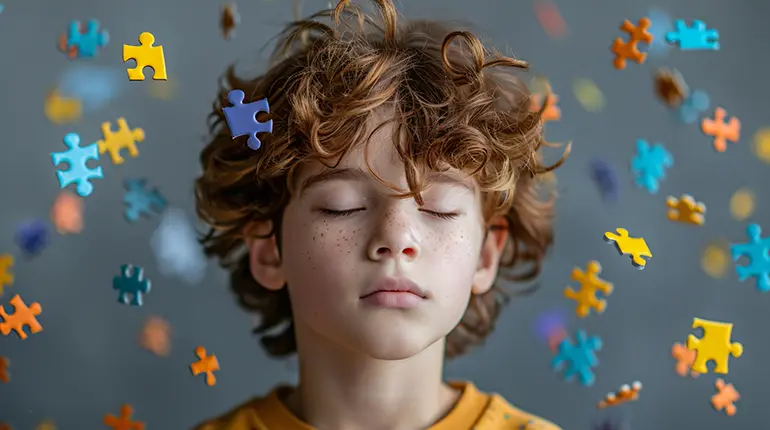What is Autism?

Autism, also known as Autism Spectrum Disorder (ASD), is a developmental condition that affects how a person thinks, communicates, and interacts with others. It is called a “spectrum” because it includes a wide range of symptoms and challenges. Some people with autism may have very few challenges, while others might have more severe difficulties. It’s important to remember that every person with autism is unique, and their experience can vary greatly.
How Does Autism Affect People?
Autism can affect many different areas of life. For example, it can impact how a person interacts with others, how they communicate, and how they process information. Some of the key characteristics of autism are:
Difficulty with Social Interactions:
Many individuals with autism find it hard to make friends or understand social cues, like body language or facial expressions. They might not know how to start or maintain a conversation and might prefer to be alone.
Communication Challenges:
People with autism might have trouble with both verbal and non-verbal communication. They may struggle to speak, or they may speak in a way that others find hard to understand. Some individuals may not speak at all and instead use gestures, pictures, or technology to communicate.
Repetitive Behaviors and Interests:
Many people with autism engage in repetitive behaviors, like repeating the same action or speech over and over. They might also have very focused interests or become upset when their routine is disrupted.
Sensory Sensitivities:
Many individuals with autism have heightened sensitivity to things like light, sound, or textures. For example, a person with autism might find bright lights or loud noises overwhelming. Some people may also have a lower sensitivity to pain or other sensations.
Causes of Autism
The exact cause of autism is not fully understood, but scientists believe that both genetics and environmental factors play a role. There is no single factor that causes autism, and it is likely a combination of different influences that can affect brain development. Research is ongoing to learn more about the causes of autism.
Early Signs of Autism
Autism can be detected at an early age, often before a child is three years old. Some early signs of autism may include:
- Not responding to their name by 12 months.
- Difficulty making eye contact or using gestures to communicate.
- Limited interest in playing with others or making friends.
- Repetitive behaviors, like hand-flapping or rocking.
- Trouble understanding or using language.
If a child shows these signs, parents may want to speak with a doctor or specialist for an evaluation. Early diagnosis and intervention can make a big difference in helping a child with autism develop skills and abilities.
How is Autism Treated?
There is no cure for autism, but there are many treatments and therapies that can help people with autism lead fulfilling lives. The goal of treatment is to help individuals with autism improve their communication, social skills, and daily functioning. Some common treatments include:
Behavioral Therapy:
One of the most effective treatments is Applied Behavior Analysis (ABA), which focuses on teaching new skills and reducing problem behaviors.
Speech and Language Therapy:
This helps people with autism improve their ability to communicate, whether through speaking, using sign language, or using devices like communication boards.
Occupational Therapy:
This therapy helps individuals develop skills for everyday tasks, like dressing, eating, and personal hygiene.
Social Skills Training:
This therapy teaches individuals how to interact with others and understand social cues.
Living with Autism
Many people with autism go on to lead successful, independent lives, especially with the right support and therapy. While challenges may still exist, people with autism have unique strengths, such as paying attention to detail or having a strong memory for facts. By understanding autism and offering the right support, society can help people with autism reach their full potential.
Autism is a lifelong condition, but with early intervention and the right resources, people with autism can live happy and fulfilling lives. It’s important to recognize and celebrate the diversity of people with autism, as their experiences and contributions are valuable to our world.
